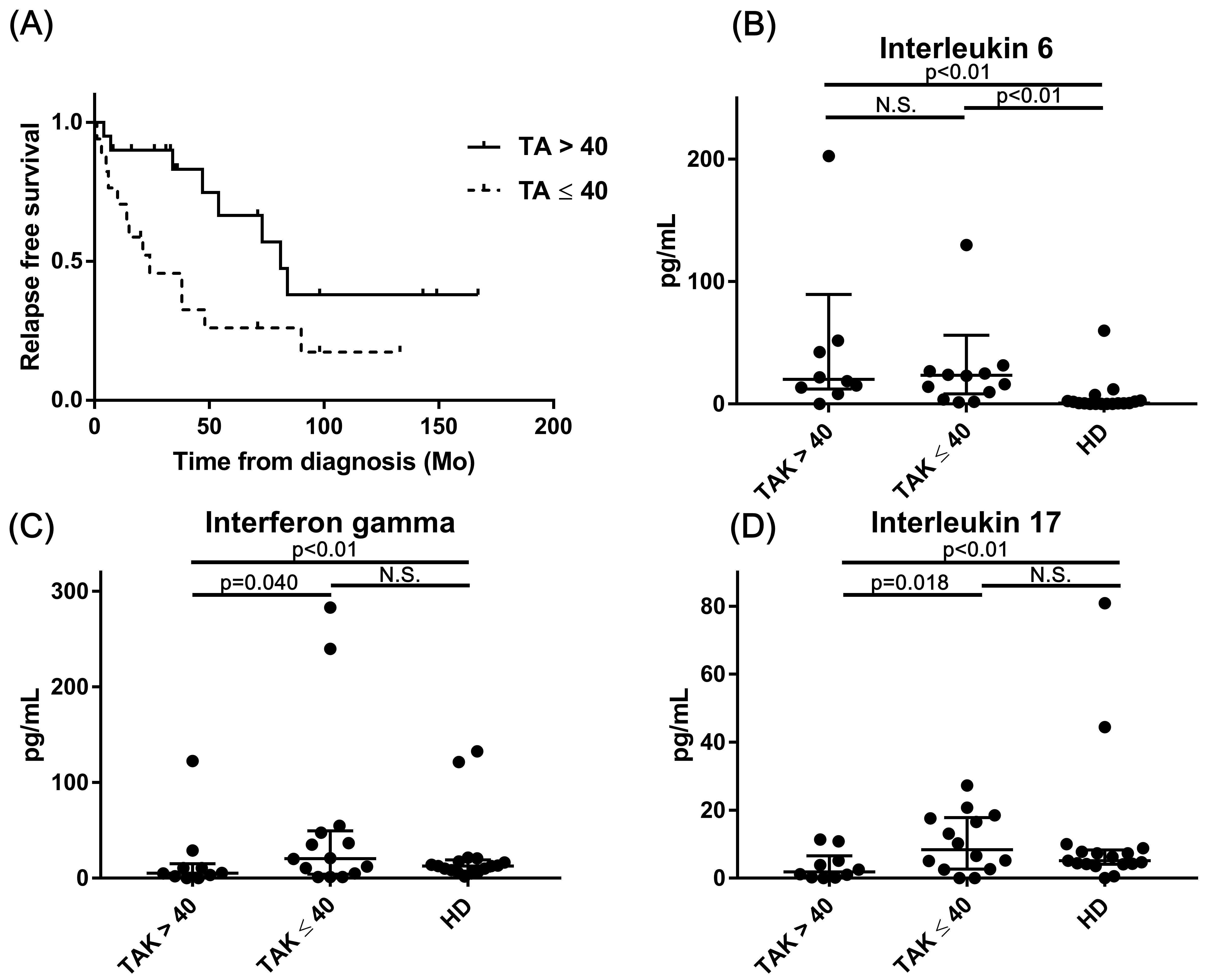Session Information
Date: Sunday, November 13, 2016
Title: Vasculitis - Poster I: Large Vessel Vasculitis and Polymyalgia Rheumatica
Session Type: ACR Poster Session A
Session Time: 9:00AM-11:00AM
Background/Purpose: The American College of Rheumatology 1990 criteria for the classification of Takayasu arteritis (TAK) include age at disease onset ≤ 40 years. We aimed to investigate the clinical characteristics of TAK that developed over the age of 40 (TAK > 40).
Methods: We retrospectively analyzed 43 patients with TAK in three foundation hospitals from April 2000 to March 2016. We collected baseline variables at diagnosis including clinical symptoms and laboratory data, and subsequent relapses using medical records. We compared the above indices of TAK > 40 to those of TAK ≤ 40 years old at disease onset (TAK ≤ 40). Multiplex cytokine/chemokine bead assays were performed using preserved sera supernatants of 24 patients with TAK at disease onset (10 TAK > 40 and 14 TAK ≤ 40) of total 43 patients and Milliplex MAP Human Cytokine/Chemokine Panel 1 Pre-mixed 41Plex (Merck Millipore, Darmstadt, Germany) analyzed with a Bio-Plex® MAGPIX™ Multiplex Reader (Bio-Rad, Hercules, CA). Seventeen sera samples of healthy donors (HD) were used to compare to sera of patients with TAK.
Results: Of 43 patients, twenty patients were TAK > 40. TAK > 40 had significantly fewer orthostatic hypotension, carotid bruit and chest pain at disease onset compared to TAK ≤ 40 (2 [10%] (TAK > 40) vs. 10 [43%], p=0.019, 7 [35%] vs. 16 [70%], p=0.034, 0 [0%] vs. 6 [26%], p=0.023). There are no differences in C reactive protein, erythrocyte sedimentation rate, angiographic classification types, frequency of positive HLA-B52, chronic renal diseases, surgical interventions and aortic regurgitation in both groups. Initial prednisolone dose was lower in TAK > 40 [median, 30 mg vs. 40mg per day, p=0.024]. Body weight at disease onset and tapering speed of prednisolone were not different in both groups. Assessed by a log-rank test, the relapse free survival rate after remission was significantly higher in TAK > 40 (p=0.029) (Figure 1A). Median interleukin 6 levels of TAK > 40, TAK ≤ 40 and HD were 26.9 pg/mL, 23.4 pg/mL and 0.7 pg/mL, respectively (TAK > 40 vs. HD: p<0.01, TAK ≤ 40 vs HD: p<0.01, TAK > 40 vs. TAK ≤ 40: p=0.98) (Figure 1B). Median interferon gamma levels were 3.1 pg/mL, 20.5 pg/mL and 12.6 pg/mL, respectively (TAK > 40 vs. HD: p<0.01, TAK ≤ 40 vs HD: p=0.77, TAK > 40 vs. TAK ≤ 40: p=0.040) (Figure 1C). Median interleukin 17 levels were 1.1 pg/mL, 8.4 pg/mL and 5.1 pg/mL, respectively (TAK > 40 vs. HD: p<0.01, TAK ≤ 40 vs HD: p=0.77, TAK > 40 vs. TAK ≤ 40: p=0.018) (Figure 1D).
Conclusion: Our study suggested that TAK > 40 years old can be treated with lower prednisolone dose for remission and had fewer relapses after remission compared to TAK ≤ 40. Decreased levels of interferon gamma and interleukin 17 at disease onset were seen in TAK > 40. Difference of cytokine profiles at disease onset may associate with clinical characteristics of TAK > 40. 
To cite this abstract in AMA style:
Fukui S, Iwamoto N, Shimizu T, Umeda M, Nishino A, Horai Y, Koga T, Kawashiri SY, Ichinose K, Hirai Y, Tamai M, Nakamura H, Origuchi T, Migita K, Ueki Y, Kawakami A. Takayasu Arteritis Developed over the Age of 40 Has Lower Levels of Interferon Gamma and Interleukin 17 at Disease Onset and Fewer Subsequent Relapses [abstract]. Arthritis Rheumatol. 2016; 68 (suppl 10). https://acrabstracts.org/abstract/takayasu-arteritis-developed-over-the-age-of-40-has-lower-levels-of-interferon-gamma-and-interleukin-17-at-disease-onset-and-fewer-subsequent-relapses/. Accessed .« Back to 2016 ACR/ARHP Annual Meeting
ACR Meeting Abstracts - https://acrabstracts.org/abstract/takayasu-arteritis-developed-over-the-age-of-40-has-lower-levels-of-interferon-gamma-and-interleukin-17-at-disease-onset-and-fewer-subsequent-relapses/
